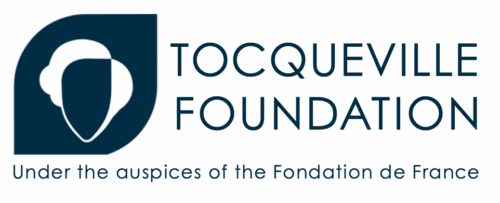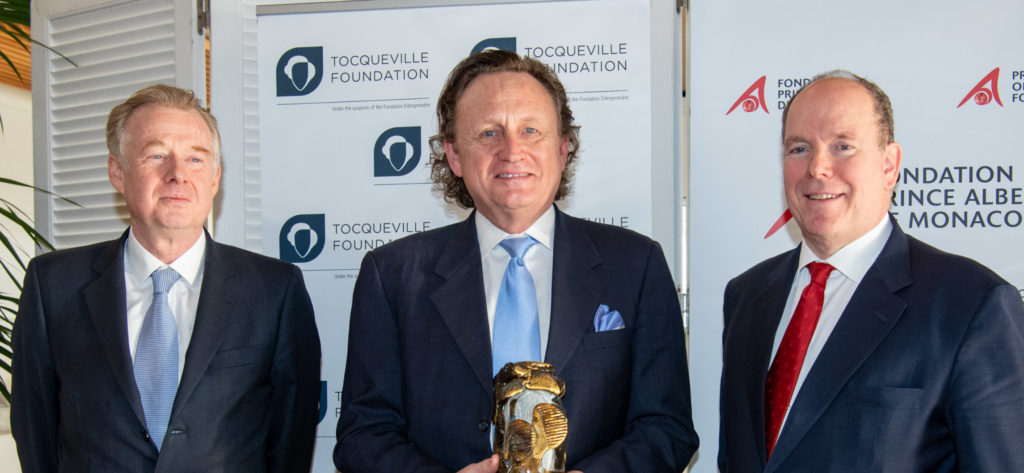Prince’s Prize, January 20th, 2020
I’m reminded today of the words, “Where you live should not determine whether you live.” I didn’t say that. It was the rock star, Bono who I think is your sometimes neighbor here in Monaco. He wrote that. And when he wrote it, it was true. It’s never been more true than it is today.
I was born in a place where we didn’t worry about whether or not we would make it to the next year. I was born in the United States and my family had the privilege of using the wheels of commerce to generate as much wealth as we ever needed.
My dad became involved in the development of a couple of ski areas you might have heard of west of Denver called Winter Park and Vail. It was in the late 1960’s and early 1970’s and my father made a small fortune. And then he realized the truth of something that we don’t talk about much today. That is that you can be rich and not happy.
Just because you’re rich doesn’t make you unhappy. The problem is, there’s very little correlation between the two. Well before Bill and Melinda Gates, my mom and dad started a foundation and they gave all their money away. It was out of that seed of philanthropy that Project C.U.R.E. grew from their garage in a little town called Evergreen just west of Denver.
I had gone on to law school. We were involved in mergers and acquisitions at the company that I was working with. And I decided that the track for my life would be finance and hedge funds in New York. So, I went back and earned a PhD in Finance – which is way too much math for a lawyer to ever have to know.
My father came to me and he said, “Young man, I could use some help.” I pledged to my dad that I would come and help the family in our little effort for about six months. That was 23 years ago that we’ve been doing healthcare work together.
A lot has changed. What started in my mom and dad’s garage in 1987, now they tell me at places like USAID and DFID that we’re the largest donor of medical supplies and equipment by volume anywhere in the world. Today, we have warehouses that we’re operating in six cities across the United States. There are big distribution warehouses in Denver, in Phoenix, in Nashville, in Houston, in Chicago, in Philadelphia and soon to be Kansas City. We will ship around 200 40-foot containers of medical supplies and equipment. Each one of those worth somewhere between $400,000 to $500,000.
In the communities where we work, the clients that we work with will work 12 hours and statistically they make about $2 a day, and they just can’t afford healthcare. That’s what we have set out to change at Project CURE and that’s what we work on every day.
There’s a central theme to what we do and one of those things that I fundamentally believe is that every one of us is here for a purpose. Mark Twain said it this way when he said, “The two most important days of your life are the day that you were born and the day that you figure out why.” We believe that everybody has a purpose.
One of the things that we did with Project C.U.R.E. was that we created an organization that is open to everyone. We will have 35,000 volunteers this year in those warehouses across the United States and I can tell you, that being the cheapskate that I am, we don’t heat those in the wintertime and in places like Chicago and Denver and it’s cold. Places like Houston and Phoenix in the summertime are hot. I tell my team that on average, if you add everything up, divided by two, it’s pretty pleasant.
Those 35,000 people have an opportunity to reach across the ocean and touch the lives of people that they’ll never meet because we created an organization that welcomes them.
I didn’t know 25 years ago what would be SDG number 17. But partnership is exactly that goal personified. We partner with our friends when we provide the recipient donations.
We’ve never gone anywhere where we haven’t been invited and we start every one of our projects with a Needs Assessment, which means that somebody from my team goes to that rural hospital, to that big city hospital, to those little clinics, and we sit down with an 18-page questionnaire. We start with the easy stuff like just the demographics. How many people are in this catchment area?
Then we get more specific. How many doctors and nurses do you have? How many of those doctors and nurses are trained as surgeons? If I send you equipment, who’s going to fix it? Where do you get the supplies? Tell me about your power grid.
I used to ask, “Do you have power?” They would look at me like I was silly. They’d say, “Well, our lights are on.” Now I ask them, “Do you have a generator?” The answer is yes. “How many times does the generator come on?” The right answer is “never.”
We learn these things and we go back and we create the contents. We pack those contents into the 40-foot containers based on what those people need. And we give it away.
We’ve learned some things. I could tell you stories all day long about the mistakes that I’ve made leading this organization and the things that we’ve learned. Of the things that we’ve learned, I’ll just focus on this one because it has to do not only with SDG 3, but also SDG 5, gender equality.
We will go on our Needs Assessments into these communities where people are just trying to survive. We’ll talk to a mom who’s pregnant and we know that the thing that’s going to make the difference in her life is whether or not she can get medical care. We tell her, “What we need you to do is we need you to come to the hospital and we need you to get prenatal checkup. We want to test you for AIDS and STDs. We want to test you for anemia. We want to find out if you have eclampsia because if they don’t get those tests, it just repeats a very bad cycle.”
That mom will look you in the eye and ask you the most logical question you ever heard. “Why would I want to go to the hospital? Everybody I’ve ever known that went to that hospital died.” There are no supplies and no equipment. The doctors are frustrated and they don’t stay. And we just continue to repeat the cycle.
That happens all over the world, friends. Those are the challenges that we have when we seek to meet the SDG goals that we have in front of us today. I can tell you that we can make a difference and we can revolutionize some of that.
About five years ago, I got involved with a group – Dr. Naveen Rao from Merck Pharmaceuticals, Claudia Conlon at USAID, Bert Peterson at the American Academy of Obstetrics and Gynecology, Christy Turlington from Every Mother Counts, and myself. We sat down and we looked at the four worst places to be a mom in Uganda and the four worst places to be a mom in Zambia.
Can we just pause parenthetically here? I just want to make a formal recognition of Geoffrey Kent and the work that you have done around the world. Project C.U.R.E. has work together with Abercrombie and Kent in places like Zambia and Uganda, Kenya, Tanzania, Cambodia and other places. It’s one thing to talk about doing something great with your company to change the world. It’s another thing to establish an office and hire someone whose responsibility it is to carry out your corporate social responsibility work. That’s exactly what Geoffrey Kent did with hiring Mr. Keith Sproule.
I have been in the A&K trucks, in those A&K Land Cruisers and driven out into the Maasai Villages where they don’t have any medical supplies. We have delivered C.U.R.E. Kit bags, $2500 at a time worth of basic supplies – gauze, gloves, needles, syringes, sutures – to help sustain those people and to save their lives. Congratulations to you, my friend. You do good work.
So we went to those four communities in Zambia and the four communities in Uganda and we said, “What if we could reduce maternal mortality by 50%?” In this community in Monaco, I think it’s around four per 100,000 live births which is very, very low. Very good. In the communities where I work, it’s around 1,000 per live birth per 100,000 live births.
Could you reduce it by 50%? Almost to a person, everyone said, “No you can’t.” We did. It took us about five years. In Zambia, we reduced maternal mortality by 48%. In Uganda, it was 53%. We launched the program Cross River State in Nigeria and I just learned at the beginning of this week that the number was a 63% reduction in mortality for these moms.
It’s 2020, the fact that a mom would lose her life trying to give life to her baby is wrong. That’s healthcare. That’s gender equality. Gender equality starts in the maternity ward and that’s what we have to do. That’s the challenge that we have.
It was Albert Schweitzer who said, “I don’t know what your destiny will be, but there’s one thing I do know. The only ones among you who will ever be truly happy are those who seek and find ways to serve other people.”
That, Prince Albert and Mr. de Tocqueville is why you’re at this table. I see you looking to serve other people. That’s what philanthropy is about and that’s why you’re here and that’s why this is a very happy group of people. Because the work you’re doing is making a difference in this world.
Your Highness, Mr. de Tocqueville, thank you for this honor. On behalf of Dana and myself, my mom and dad who are in great health by the way, and our small team – we only have about 35 employees, but there are 35,000 people across the United States – who have worked hard to touch hands and link arms with people all over this world and make a difference. On behalf of all of those people, thank you for this honor. God bless you. Thank you.

